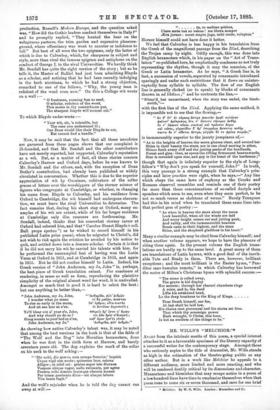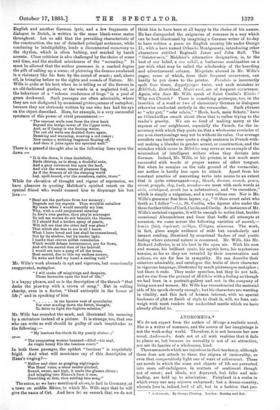MR. WILLS'S " MELCHIOR."
APART from the intrinsic merits of this poem, a special interest attaches to it as a favourable specimen of the literary capacity of a successful writer for the contemporary stage. Amongst those who seriously aspire to the title of dramatist, Mr. Wills .stands as high in the estimation of the theatre-going public as any other author. But in a work like Melchior he appeals to a. differentaudience, more limited and more exacting, and who will be rendered doubly critical by its dimensions and character. Mannerisms and blemishes that may escape notice in a poem of a few hundred lines have time to emphasize themselves when that poem runs to some six or seven thousand, and save for one brief • Melchior. By W. G. Wills. London : Macmillan and Co.
English and another German lyric, and a few fragments of dialogue in Dutch, is written in the same blank-verse metre throughout. Let us add that the prevailing characteristic of the construction, the use of detached principal sentences, while conducing to intelligibility, lends a disconnected monotony to the rhythm, which is often halting, and marked by harsh accents. Close criticism is also challenged by the choice of scene and time, and the studied minuteness of the " mounting." It must be allowed that the author possesses in a marked degree the gift of calling up a scene; of picturing the dreams awakened in a visionary like his hero by the sound of music ; and, above all, in bringing before us the sights and sounds of Nature. Mr. Wills is quite at his best when he is telling us of the flowers in
an old-fashioned garden, or the weeds in a neglected field, or the behaviour of a "solemn conference of frogs" in a pool of green duckweed. Such passages are often admirable, where they are not disfigured by occasional grotesqueness of metaphor, because they are obviously written by one who has had his eye on the object described. Here, for example, is a very successful specimen of this power of vivid presentment :— "The convent walls rose from the river bank Beyond the bridge tower of the Upper town, And, as if fusing in the fleeting water, The red old walls are doubled down again, Breaking and wavering, weaving a red tissue ; Now seems a writhing fragment floating off, And then it joins again the spectral wall."
There is a graceful thought also in the following lines upon the dawn
"It is the dawn, it rises doubtfully,
Birds chirrup, as in sleep, a doubtful note, And a grey cerement lies upon the land, And o'er the water, tracts of phantom fog, As if the dreams of all the sleeping world Lay. spell-bound, o'er the meadows, cattle, trees."
While for elevation of thought and vigour of expression, we have pleasure in quoting Melchoir's spirited retort on the cynical friend who would counsel him to disparage his lost love :—
"Steal not the perfume from her memory ;
Degrade not my regrets. Thou would'at nnhallow My tears when I would sanctify my loss.
Why, with a cold conjectural scrutiny In love's own garden, thou play'st scavenger To tell me worms do stir beneath the blooms.
If I should find a broken spray of pearls, Wilt tell me that the other half was glass ?
That which she was to me is all I know.
What I have loved and lost shall be remembered, Not by its shadow, but its tender light.
I loathe that craven selfish consolation Which would debase bereavement., pry for flaws, And sift the sacred dust of the beloved.
I would not bate a pang of all the moan, Most sacred, due to this my endless sorrow, To wake and find my heart a smiling void."
Mr. Wills's work abounds in apt and vigorous, but occasionally exaggerated, metaphor.
"I will shake off misgivings and despairs, Those barnacles upon the keel of life,"
is a happy phrase, and so is the description of the thrush "that decks the pine-top with a crown of song." But in calling charity, even in a doctor, "bland antiseptic in the house of life ;" and in speaking of him
in the burrow vast of speculation For ever sending down the ferret, thought, To drive to light the fugitive solution,"
Mr. Wills has overshot the mark, and illustrated his meaning by a caricature instead of a picture. It is strange, too, that one who can write so well should be guilty of such ineptitudes as the following :—
" My luscious fire-throb lit thy pearly shrines;"
"The conquering woman haunted—filled—his son], As virgin honey fills the luscious comb."
In both these passages, the epithet "luscious" is exquisitely frigid. And what will musicians say of this description of Hans's singing ?—
" Mellow and clear as gargling nightingale Was Hans' voice, a tenor tender-pitched,
Round, sweet, and high, it made the glasses chime ;
And mingling into Blanca's bum it rose, Trembling at first, then settling into song."
The scene, as we have mentioned above, is laid in Germany, at a town on middle Rhine, to which Mr. Wills says that he will give the name of Ort. And here let us remark that we do not
01*—•
think him to have been at all happy in the choice of his names. He has disregarded the exigencies of romance in a way which can be best illustrated by imagining a German writer of to-day to have written a poem on English country life under George II., with a hero named Orlando Montgomery, introducing other characters entitled Reginald Jones and John BalL The " Geister-seor," Melchior's alternative designation, is, to the best of our belief, a vox nihili, a barbarous combination on a par with what may be called the scholarship of the hoarding and advertisement column. Misprints abound in Mr. Wills's pages, some of which, from their frequent occurrence, can hardly be put down to the printer. Frilulein is incorrectly spelt four times, doppelgiingee twice, and such mistakes as Biblithek, Deutchland, Music-anal, are of frequent occurrence. Again, why does Mr. Wills speak of Saint Cecilia's Kirche ? Why not Church ? There is something grotesque, too, in the insertion of a word or two of elementary German in dialogues otherwise conducted entirely in the vernacular. Such phrases as "Behr gut," "Behr schon," "Hoch, hoch, mein Schatz," have an 011endorfflan smack about them that is rather trying to the reader's gravity. We are so fond of making merry at the expense of our neighbours, especially the French, for the in- accuracy with which they quote us, that a wholesome reminder of our oarn shortcomings may not be without its value. Our average novelists can hardly ever quote a single sentence in French with- out making a blunder in gender, accent, or construction, and the mistakes which occur in Melchior may serve as an example of the misconduct of intelligent writers when they deviate into German. Indeed, Mr. Wills, or his printer, is not much more successful with words or proper names of other tongues. But when he remains on the safe ground of the vernacular, our author is hardly less open to attack. Apart from his constant practice of converting verbs into nouns to an extent that is quite extravagant—e.g., blench, drowse, crouch, yearn, accost, grapple, cloy, bask, wander—we meet with such words as eirie, cal alepsed, wroth (as a substantive), and "to smoothen," which is simply a vulgarism, and a very odious one. Nor is Mr. Wills's grammar free from lapses, e.g.," 0 thou sweet saint who fleeth as I follow "—i.e., St. Cecilia, who figures also under the three further titles of Cecil, Cecile, and Cecily. As instances of Mr. Wills's metrical vagaries, it will be enough to notice that, besides occasional Alexandrines and lines that baffle all attempts at scansion, we come across the following varieties of accent,— lemtin (bis), aspirant, -meilign, COlogne, sonorous. The work, in fact, gives ample evidence of wide but unscholarly and inexact reading, illumined by occasional flashes of real poetic feeling where external nature is concerned. Mr. Wills, like Mr. Richard Jefferies, is at his best in the open air. With his men and women, his brilliant cynic, his mystic hero, his mysterious heroine, BO far as they are revealed by their conversation and actions, we are far less in sympathy. He can describe their exteriors admirably, and catalogue the traits of their character in vigorous language, illustrated by much picturesque metaphor ; but there it ends. They make speeches, but they do not talk, and we rise from the perusal of Melchior with a feeling as though we had been in a portrait-gallery and not in the company of living men and women. Mr. Wills has reconstructed the material side of his epoch cleverly enough ; but his characters are wanting in vitality, and this lack of human interest, with no special freshness of plot or finish of style to cloak it, will, we fear, out- weigh with most readers the undoubted merits which we have already alluded to.



































 Previous page
Previous page